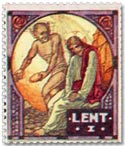New
This Week
Everything new is here.
News
News Centre
News archive

Basics
Start here
Anglicans believe...
The Prayer Book
The Bible
Letters
Read letters to AO
Write to us
Resources
Resources A to Z
World Anglicanism
Anglican Communion
In full communion
Not in the Communion
Dioceses
and Parishes
Africa
Australia
Canada
England
Europe
Ireland
Japan
New Zealand
Scotland
USA
Wales
World
Vacancies
Centre
List a vacancy
Check openings worldwide
Add a site
or link to AO
Add a site to AO
Link to AO
About Anglicans
Online
Back issues
Staff
Awards and publicity
Beginnings, AO
at 5
Sponsors
About our logo

|
|
Hallo
again to all.
 In
the traditional lectionary
of the western church, the three Sundays
before Lent are distinct from both Epiphany and Lent. They form their
own mini-season of Pre-Lent, guiding us gently between the marvels
of Epiphanytide and our own readiness on Ash Wednesday to say with
George Herbert, "Welcome, dear feast of Lent." These three
Sundays cover eighteen little days of liturgical time: Septuagesima,
Sexagesima and Quinquagesima. Their Latin names mean that each Sunday
is, respectively, about 70, 60 and 50 days from Easter. The Roman communion
abolished them in 1969, and they disappeared without the firing of
a shot; we are not aware of the formation anywhere of a Society for
the Preservation of the Gesimas. They are still on the official calendars
of some churches in the Anglican Communion, but they have more or less
disappeared from the main stream of our liturgical life outside of
church-stamp collections and the still-popular hymn 'Advent
tells us Christ is near.'* In
the traditional lectionary
of the western church, the three Sundays
before Lent are distinct from both Epiphany and Lent. They form their
own mini-season of Pre-Lent, guiding us gently between the marvels
of Epiphanytide and our own readiness on Ash Wednesday to say with
George Herbert, "Welcome, dear feast of Lent." These three
Sundays cover eighteen little days of liturgical time: Septuagesima,
Sexagesima and Quinquagesima. Their Latin names mean that each Sunday
is, respectively, about 70, 60 and 50 days from Easter. The Roman communion
abolished them in 1969, and they disappeared without the firing of
a shot; we are not aware of the formation anywhere of a Society for
the Preservation of the Gesimas. They are still on the official calendars
of some churches in the Anglican Communion, but they have more or less
disappeared from the main stream of our liturgical life outside of
church-stamp collections and the still-popular hymn 'Advent
tells us Christ is near.'*
 We
do not know anyone who ever looked forward with strained anticipation
for one or another of the Gesimas as his or her favourite Sunday in
the year, but it strikes us in retrospect that they may have contained
a valuable point about churchly life: we can always prepare ourselves
for what lies ahead by patience and confidence, and sometimes this
can even take the form of preparation for preparation. Lent, after
all, is a season in which to prepare ourselves for Easter. But can
we really go directly from noise and feasting to quietness and religious
discipline at the flip of a switch? We do not know many whose lives
of prayer and activity are so malleable. It is a liminal on-the-borders
season like Pre-Lent with its Gesimas that allows us to think for a
time longer than the Ash Wednesday service what our Lenten life will
be, and where we hope it will take us. We
do not know anyone who ever looked forward with strained anticipation
for one or another of the Gesimas as his or her favourite Sunday in
the year, but it strikes us in retrospect that they may have contained
a valuable point about churchly life: we can always prepare ourselves
for what lies ahead by patience and confidence, and sometimes this
can even take the form of preparation for preparation. Lent, after
all, is a season in which to prepare ourselves for Easter. But can
we really go directly from noise and feasting to quietness and religious
discipline at the flip of a switch? We do not know many whose lives
of prayer and activity are so malleable. It is a liminal on-the-borders
season like Pre-Lent with its Gesimas that allows us to think for a
time longer than the Ash Wednesday service what our Lenten life will
be, and where we hope it will take us.
 As
any good teacher, cook or athlete understands, there is little sense
in preparing for something of a sudden, unless one has already prepared
to prepare. One must read before making lesson plans; make a recipe
and go to market before getting out the pots and pans; and woe to the
runner who fails to stretch before warming up. In a Christian context,
one can decide beforehand what one's Lenten efforts will
be, but if the Amazon book orders are not made in time, books may not
arrive before Lent has gone ahead at real speed. Likewise, places for
extra quiet and prayer and service cannot usually be carved out of
schedules on the spot. The carving has to happen before the real work
of preparation can take place. The presence of the Gesimas' preparation-for-preparation
in the church calendar since at least the eighth century would make
the case against this being a particularly modern problem. We tend
to think of ourselves as generally busier than the ancients, and so
excused from the strength of their devotion, but three Gesimas call
us to take stock of that excuse and to evaluate it in terms of the
very Easter from which they are named. While we lump them together
as 'Pre-Lent,' their own names are taken not from their relation to
Lent, but from their hopeful focus on how far they are from Easter.
This is a reassuring and lovely thing written into the old calendar,
and its loss is not a small thing. As
any good teacher, cook or athlete understands, there is little sense
in preparing for something of a sudden, unless one has already prepared
to prepare. One must read before making lesson plans; make a recipe
and go to market before getting out the pots and pans; and woe to the
runner who fails to stretch before warming up. In a Christian context,
one can decide beforehand what one's Lenten efforts will
be, but if the Amazon book orders are not made in time, books may not
arrive before Lent has gone ahead at real speed. Likewise, places for
extra quiet and prayer and service cannot usually be carved out of
schedules on the spot. The carving has to happen before the real work
of preparation can take place. The presence of the Gesimas' preparation-for-preparation
in the church calendar since at least the eighth century would make
the case against this being a particularly modern problem. We tend
to think of ourselves as generally busier than the ancients, and so
excused from the strength of their devotion, but three Gesimas call
us to take stock of that excuse and to evaluate it in terms of the
very Easter from which they are named. While we lump them together
as 'Pre-Lent,' their own names are taken not from their relation to
Lent, but from their hopeful focus on how far they are from Easter.
This is a reassuring and lovely thing written into the old calendar,
and its loss is not a small thing.
  Surely
this
Gesima logic—the idea that preparation requires preparation—can be
taken too far: after all, there is always a new holyday for which to
prepare during the Christian year. (We can see something of this tendency
in Eastern Orthodoxy, where 'little
lents' have
grown up before the Dormition and the Feast of Saints Peter and Paul.
This may work in an Orthodox liturgical context, but it is not how
Anglicans and other western Christians have tended to measure out the
ecclesiastical year.) A preparatory season for the Ascension or Pentecost
or All Saints Day would turn the calendar into a jumbly mess in short
order. No matter the name of the Sunday on pew-sheets, lectionaries
and calendars, though, the practical ancient wisdom of the Gesimas
is a helpful, gracious guide to walking through the young year carefully. Surely
this
Gesima logic—the idea that preparation requires preparation—can be
taken too far: after all, there is always a new holyday for which to
prepare during the Christian year. (We can see something of this tendency
in Eastern Orthodoxy, where 'little
lents' have
grown up before the Dormition and the Feast of Saints Peter and Paul.
This may work in an Orthodox liturgical context, but it is not how
Anglicans and other western Christians have tended to measure out the
ecclesiastical year.) A preparatory season for the Ascension or Pentecost
or All Saints Day would turn the calendar into a jumbly mess in short
order. No matter the name of the Sunday on pew-sheets, lectionaries
and calendars, though, the practical ancient wisdom of the Gesimas
is a helpful, gracious guide to walking through the young year carefully.
Welcome,
dear feast of Lent.

All of us here at Anglicans Online
Last
updated: 26 February 2006
URL: http://anglicansonline.org
* Advent tells us Christ is near; / Christmas tells us Christ is here!
/ In Epiphany we trace / all the glory of his grace.
Those three Sundays before Lent / will prepare us to repent; / that
in Lent we may begin / earnestly to mourn for sin.
|

